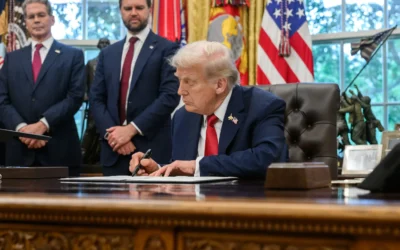President Trump’s ongoing tariff threats and the pending trade wars between the United States and Canada, the EU, and other U.S. targets have created media headlines and economic debate for and against tariffs, governments’ long-standing tools for raising revenue and protecting domestic industries from foreign competition.
Most economists reject systematic protectionism as welfare-reducing and acknowledge that open free trade is most beneficial for human prosperity in the long term. Yet, many believe that today’s political reality requires compromising the principle of free trade with retaliatory tariffs to entice tariff-initiating nations to lower them and agree to fair trade deals.
I will not offer economic arguments about tariffs here but rather present a principled moral case against tariffs and for free trade made by Ayn Rand, the foremost defender of capitalism. I present the case with full awareness that the current reality is not capitalism but mixed or controlled economies that increasingly resort to protectionism. But free trade, and capitalism, cannot be achieved and sustained unless the moral case for it (and against tariffs) is known.
The economic arguments against tariffs are valid but don’t explain why tariffs are fundamentally immoral. It is true that they lead to economic misery to individuals and businesses by increasing the cost of everything, from food to fuel to construction materials and by causing job losses. But most economists today do not examine the root causes of tariffs’ negative impact from a moral perspective. They take the mixed economy for granted and don’t think about international trade that could be free of government intervention.
The MS Edge AI Co-pilot’s answer to my question about the role of government in international trade indicates this. It listed the following: protecting consumers from misinformation, providing infrastructure, facilitating fair trade agreements, protecting domestic industries, providing economic forecasts and trade statistics, and protecting national security. When specifically asked about the government’s role in international trade under laissez-faire capitalism, the Co-pilot offered the same answers.
But Ayn Rand did address the root cause of tariffs’ destructiveness, based on the fundamental requirements of human survival. Building on the writings of Aristotle and historical evidence, she observed that unlike other species, we survive primarily by reason: using our minds to adhere to reality and acting accordingly. Lacking physical strength, speed, or claws and fangs, we must think to survive.
To be able to think – to sustain our lives – we must be free from physical coercion or the threat of it. No new discoveries or inventions beneficial to humans have ever been made under dictatorships where people obey blindly and are not allowed to think and act freely. All beneficial inventions have been made under conditions of relative freedom.
Rand concluded that the ideal social system for human flourishing is not the rights-violating mixed economy but laissez-faire capitalism that protects individuals’ freedom, or rights, against physical coercion. She defined capitalism as “a social system based on the recognition of individual rights, including property rights, in which all property is privately owned.” Under capitalism, the government has but one role: to protect the rights of the citizens (through the law courts, the police, and the military) against the initiation of physical force by others.
In Rand’s view, capitalism’s foreign policy is defined by free trade: “… the abolition of trade barriers, of protective tariffs, of special privileges—the opening of the world’s trade routes to free international exchange and competition among the private citizens of all countries dealing directly with one another.”
According to Rand, then, tariffs are destructive because they are a form of physical coercion by the government. They violate the citizens’ freedom to choose with whom to trade and on what terms and thus limit their ability to pursue their lives. It is not the government’s role to “negotiate trade deals” or “protect domestic industries.” The only role of the government in international trade, as in any realm, is to uphold individual rights (by protecting contracts and penalizing fraud), which extends to protecting national security against hostile foreign dictatorships, such as China and Iran.
To those who advocate a compromise between free trade and protectionism – such as only some tariffs on only some products – Rand would point out that it means throwing out the principle of free trade altogether and leaving it to the arbitrary power of government to determine how much freedom we are allowed and when, which always leads to freedom’s further erosion as the increased government controls in the world’s mixed economies show.
To summarize Ayn Rand’s moral case against tariffs and for free trade and capitalism, I leave the last word to her:
“When men are free to trade, with reason and reality as their only arbiter, when no man may use physical force to extort the consent of another, it is the best product and the best judgment that win in every field of human endeavor, and raise the standard of living—and of thought—ever higher for all those who take part in mankind’s productive activity.”




